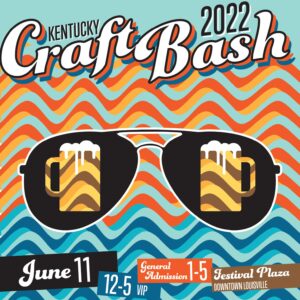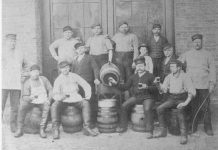
Whenever I’m called upon to explain the brewing process, references to beer’s ancient origins are a prerequisite.
People have strange ideas about the history of alcoholic beverages, and you’ll hear statements like “wine in the Bible was actually unfermented grape juice,” a plainly bizarre assertion owing to ideology and theology, not to the process of fermentation as a purely natural phenomenon.
Humans are nothing if not persistent, and while the exact configuration and performance of yeast couldn’t be observed until the microscope came along, we’re perfectly capable of sorting causes and effects, and since the very beginning, we’ve been toying with ways to more efficiently guide the conversion of sugar water to a soothing, utilitarian beverage.
In the realm of potable archaeology, file this entry under “man has not lived by bread alone.” I’ve highlighted a key passage in bold.
Ancient Beer Is Craft’s New Frontier, by Sara Toth Stub (Sapiens)
“We will probably never find out which was first, beer or bread,” (archaeologist Li) Liu says. In fact, some scholars ascribe to a theory, first put forward in 1953, that beer—not bread—drove the advent of farming. Bread is a source of food, whereas beer’s alcoholic content may point toward more social or cultural practices rather than purely nutritional purposes. If beer predates agriculture or even bread, it provides a clue to the inner life and social complexity of pre-agrarian peoples.
“We have to acknowledge in all of this that alcohol is not just for sustenance,” Liu said. “Alcohol, or growing grain for making alcohol, indicates the presence or need for imaginative, artistic, or spiritual elements in life. These elements of the past are often hard to see in archaeology, but beer can tell us a lot about them.”
Imagination, art and spirituality. Or, like I’ve been saying all along: It makes us better people—and as people, we need betterment, desperately.
During modern times, or at least since I began paying attention to the wider world of beer, All About Beer magazine has served as indispensable chronicle of the movement. That is, until it went belly up a few years back owing to managerial incompetence. Now, thanks to John and Andy, we can say “welcome back to All About Beer.”
John Holl and Andy Crouch are pleased to announce our acquisition of the All About Beer brand, digital assets, and editorial archive. In 2019, we founded Beer Edge to bring fresh content and insight into the beer industry through the lens of our combined more than 40 years of experience in beer. We launched a website, hosted podcasts including Drink Beer, Think Beer and The Beer Edge, and more recently engaged with our partner ProBrewer to provide business coverage of the beer industry on its website.
We are proud to add All About Beer to our media network and excited to uphold its legacy as a critical voice covering beer’s history while reshaping its role in the present-day beer culture. Stewardship of this esteemed and much beloved media publication remains central in our minds while we’re also energized to put our stamp on it.
In a final, sad news note, Spencer Brewery, America’s only Trappist, has closed.
This month, St. Joseph’s Abbey, located an hour west of Boston in the town of Spencer, announced it was closing America’s only Trappist-run brewery.
Writing at America (The Jesuit Review), John W. Miller offers a facile perspective, with which I’m about to disagree.
The only Trappist brewery in the U.S. is closing (and IPAs are to blame)
Spencer Brewery has been unprofitable because its complex and dry Belgian-style beers have been unable to compete with the sweet, hoppy India pale ales, or I.P.A.s, that have raged through the U.S. beer market in the last decade like Mongol horsemen sacking their way through Asia.
Spencer’s web site describes the brewery’s line of Trappist-heritage ales. It also lists Imperial Stout, Vienna Lager, Pilsner, and yes, an IPA, albeit for European distribution. While Miller finds corroboration from none other than Andy Crouch (co-rescuer of All About Beer), my guess is pandemic-level hopheadedness isn’t so much the reason for Spencer’s demise; rather, the monks found it impossible to further their niche brands in the absence of prohibitive investment, owing not to what 9,000 other American breweries brew, but that 9,000 other American breweries exist.
Consider just this one point, as Miller readily identifies: “The monks at St. Joseph’s never agreed to a tasting bar or restaurant on site, even if it might have popularized the brand. ‘The brewery is too close to the church to invite in outsiders,’ said Father (William) Dingwall.”
Even casual observers understand that a restaurant would have been a risky business proposition, but matters being equal in terms of local zoning regulations and the like, a tasting room or similarly formatted outlet for Spencer’s beers probably would have provided an invaluable revenue source. How do we know? Because most of the other 9,000 American breweries survive because of them.

Roughly 100 of those breweries operate in Kentucky, which brings us to the 5th Annual Kentucky Guild of Brewers Craft Bash, coming to Festival Plaza at Waterfront Park (231 Witherspoon Street, Louisville) on Saturday, June 11th, with VIP admission at 12 noon and general admission at 1:00 p.m. Both include a commemorative glass; tickets can be purchased here.
The Kentucky Craft Bash benefits Cure CF as well as the HOP Foundation, both non-profit organizations, and is sponsored by the non-profit Kentucky Guild of Brewers (KGB), which exists to advocate for the Kentucky brewing industry, promote its member breweries and serve as a conduit for pertinent beer and brewing information.
The 2022 Kentucky Craft Bash represents a return to the event’s festive norms after a limited capacity celebration in 2021. According to an information release, “this festival will show the state that beer has grown to be more than just ‘bourbon’s little brother.'”
“I always look forward to Craft Bash,” said Charley Hamilton, owner of Dreaming Creek Brewery and President of the Kentucky Guild of Brewers. “It gives Dreaming Creek Brewery (Richmond) a chance to share our beers with lots of folks who may not otherwise try them. It also gives us a place to network with all the other breweries in Kentucky and share our industry stories. It’s truly a unique industry that we’re in and the camaraderie amongst brewers is awesome. I can’t wait to see everyone this year.”
There will be hundreds of beers to sample, distribution favorites, taproom only releases, and one-off specialty beers. Whether you are a beer fan or not, this is a festival that offers something for everyone, and is a great opportunity to try something new. There will also be cider, seltzer, and non-alcoholic options available, with plenty of water, food, and activities. We hope you’ll come to sip on something new with us.




















 Roger Baylor is an educator, entrepreneur and innovator with 40 years of hands-on experience and expertise as a beer seller, restaurateur and commentator. As the co-founder of New Albany’s Sportstime Pizza/Rich O’s Public House (which later became New Albanian Brewing Company) in the 1990s and early 2000s, Baylor played a seminal role in Louisville’s craft beer renaissance. Currently he is the beer director at Pints&union in New Albany and Common Haus Hall in Jeffersonville. Baylor’s “Hip Hops” columns on beer-related subjects have been a fixture in F&D since 2005, and he was named the magazine’s digital editor in 2019.
Roger Baylor is an educator, entrepreneur and innovator with 40 years of hands-on experience and expertise as a beer seller, restaurateur and commentator. As the co-founder of New Albany’s Sportstime Pizza/Rich O’s Public House (which later became New Albanian Brewing Company) in the 1990s and early 2000s, Baylor played a seminal role in Louisville’s craft beer renaissance. Currently he is the beer director at Pints&union in New Albany and Common Haus Hall in Jeffersonville. Baylor’s “Hip Hops” columns on beer-related subjects have been a fixture in F&D since 2005, and he was named the magazine’s digital editor in 2019.




